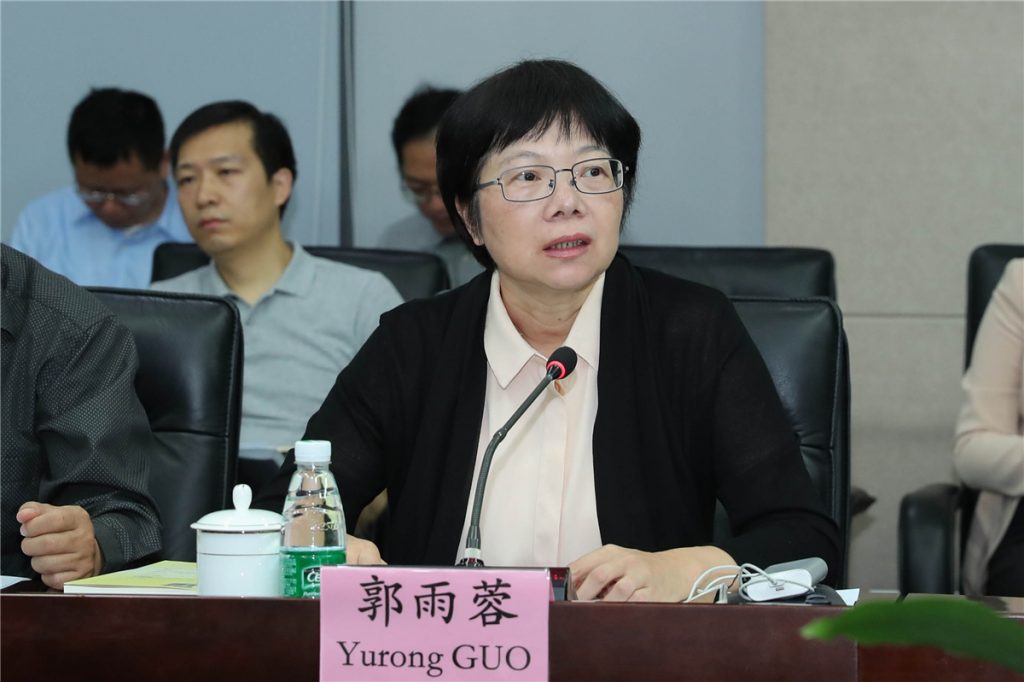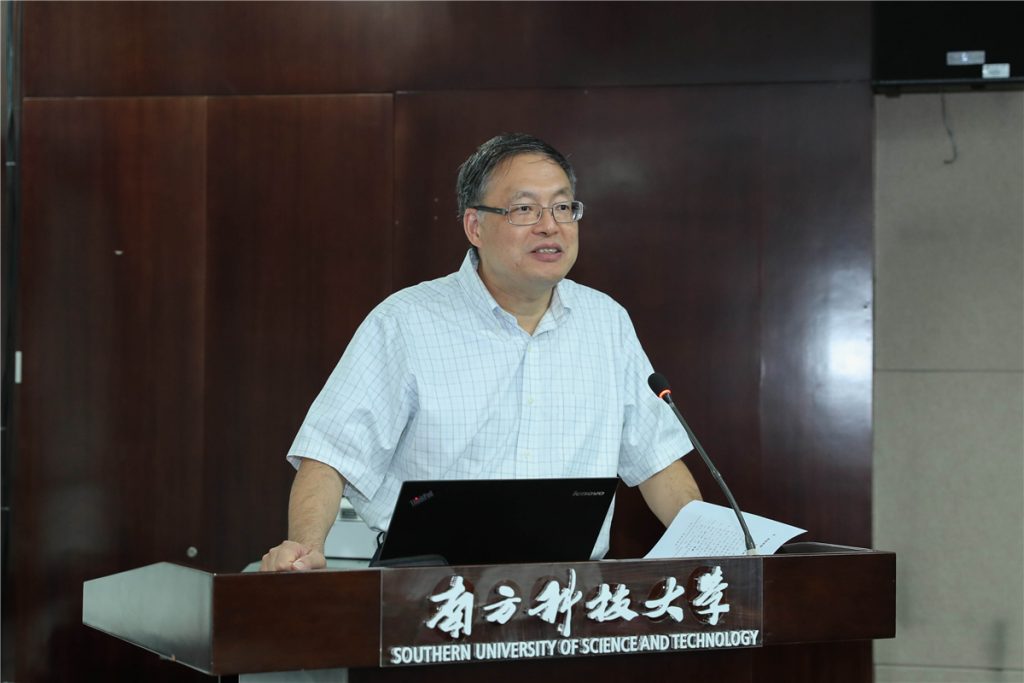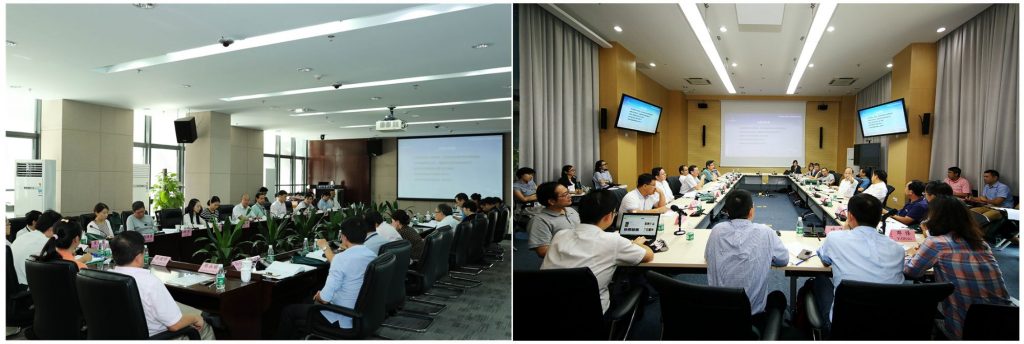On October 22, Southern University of Science and Technology held 2016 Autumn Teaching Work Conference in Room 401 of the administrative building. Chairwoman of University Council Guo Yurong and President Chen Shiyi attended and addressed the conference. A total of more than 70 other attendees included university leaders, members of the Committee of Teaching Guidance, heads of schools and departments, heads of administration and logistic departments, deans of academies, and teaching secretaries of schools and departments. Vice-President Wu Chuanyue and Vice-Provost Huang Kefu presided over the conference.
The teaching work conference, based on the actual situation of our SUSTech, reviewed and summarized our undergraduate education and teaching work in the past year. The conference fully analyzed the existing problems and thoroughly discussed the future priorities in our undergraduate education and teaching. The conference was divided into three parts: theme reports, group discussions and a summary.

Remarks by Guo Yurong
MS. Guo Yurong gave a speech at the conference on the morning of October 22. She recalled the SUSTech’s recent achievements and expressed her expectations for our future development. She encouraged faulty members to make exploration and innovation, realize their dreams, and work passionately. Ms. Guo Yurong pointed out that the teaching work is very important for building the SUSTech into a world-class university. She hoped that the conference could focus on improving teaching quality and talent training quality, “find our position, identify our direction, locate our problems, and figure out solutions” to guide our future work. Ms. Guo Yurong stressed that, in addition to doing a good job of teaching the curriculum, teachers should also help the students establish correct values and a positive outlook on life. In the future, our university will introduce a new way of teaching the “two courses.” All teachers should lead by example, put students at the center, encourage them to explore issues, cultivate their innovative spirit, instill them with patriotism and positive energy, and lay a solid foundation for their future development.

Wu Chuanyue presided over the conference

The reporting session
Wang Dejun, head of Teaching Affairs Department, delivered a report on the theme of “Exploring the Laws of Education and Teaching, Cultivating Top-notch Innovative Talents,” which introduced the SUSTech’s undergraduate education and teaching work from four aspects, namely the latest basic data on our undergraduate teaching, the characteristics of our undergraduate talent training, the problems and puzzle in our undergraduate education, and how to carry out teaching innovation and reform.
Based on practical work, Associate Professor Li Jingzhi of Department of Mathematics, Professor He Jiaqing of Department of Physics, Professor Huang Limin of Department of Chemistry, Associate Professor Deng Yi of Department of Biology, Professor Chen Yifan of Department of Electrical and Electronic Engineering, Professor Cheng Xin of Department of Materials Science and Engineering, Associate Professor Zheng Yi of School of Environmental Science and Engineering, Doctor Kathy O’Sullivan of the Language Center, and Chief Librarian E Henian reported on hierarchical teaching, laboratory construction, discipline construction, teaching reform, teaching process management and other aspects. They also shared the education and teaching exploration and practice, problems and puzzles, experience and prospects of different schools and departments.

The reporting session
On the afternoon of October 22, Huang Kefu delivered a theme report entitled “Respecting Individual Development, Cultivating Graduates with SUSTech Characteristics.” He raised five interrelated questions to explore the essence of higher education, provoking the attendees’ thinking on the SUSTech’s educational positioning and the coexistence of multiple talent training modes. In order to improve our university’s teaching quality, as pointed out by Huang Kefu, we should provide students with hierarchical teaching and let “benchmark” students play a demonstration role. Professional core courses should be taught through “large class lecturing and small class tutoring” so that students can learn these courses in an in-depth and well-trained manner. For elective courses, we should respect students’ individual interest, break disciplinary barriers, and construct unique knowledge systems. Huang Kefu stressed the full-cycle tracking and evaluation of each student’s state and the timely warning of any problems in his academic performance.

Group discussions
The attendees were divided into two groups to discuss the topics of general education and professional education, practical teaching and innovation and entrepreneurship education, coordination of academies and departments, teaching laboratory construction and experiment teaching reform, and teacher incentives. In the discussions, the attendees expressed their views freely and put forward a lot of constructive suggestions. Chen Yuehong (Director of Humanities Center) and Rong Yiming (Dean of Department of Mechanical and Energy Engineering) summarized and reported the discussions on behalf of each group, respectively.

Remarks by Chen Shiyi
President Chen Shiyi made concluding remarks. Chen Shiyi said, the SUSTech is currently developing rapidly and is faced with challenges and problems as well. In order to build the SUSTech into a first-class university, we should unswervingly combine the advantages of Chinese and Western education and the experience of domestic and international first-class universities. He put forward five requirements: First, we must adhere to student-centered teaching, respecting students and giving them the right to choice while properly guiding them in academic studies, styles of study and other aspects. Second, we should coordinate the relationships among academies, schools and departments, and various administrative and logistic departments. Third, we should rationally plan professional education and general education. Fourth, we should attach importance to English education and adopt an open perspective to make English education a feature of the SUSTech as a world-class university. Fifth, we should advocate the good teaching style and the good style of study and assign the best teachers to the forefront of teaching; all teachers should really put their hearts into the educational cause, interact with students, and make teaching benefit themselves as well as students; and the SUSTech should develop our own style.
The conference identified the direction of our future education and teaching work and laid a foundation for further improving the talent training quality of our university.
Proofread By
Photo By